Abstract
Context:
One-day orientation program (OP) for fresh MBBS entrants is running in our institute since 2010, but has never been evaluated.
Aims and Objectives:
To evaluate the OP from students’ and faculty perspectives and to recommend a revised program.
Methodology:
Totally 439 students of three MBBS batches were enrolled in the study. Students were asked to fill an anonymous semi-structured, pretested questionnaire. Views of faculty members were recorded by conducting three focus group discussions.
Results:
More than half of the students have never attended the institutional OP due to timings issue. Overall rating of the program was good, but many students and faculty members suggested changes in the duration, timings and course content of the OP. A revised OP was proposed to the authorities.
Conclusion:
The current institutional program though rated good, requires a lot of amendments. The revised proposed OP should be implemented from the coming session.
Keywords: Focused group discussion, orientation program, program evaluation, qualitative analysis
INTRODUCTION
World orientation literally means familiarization with something; may be a new program, or a new establishment, etc. Professionals have always advocated that the orientation of any person being inducted in a new program, should be the first task of any organization; which can be in the form of a conventional orientation program (OP) or merely a walk around the establishment.[1] OP is considered valuable in lowering the anxiety of new workplace, and can benefit both faculty and the new entrants.
Many medical colleges in India are running OP of new MBBS entrants of varying duration of 1–3 days.[2,3] We at our institute are also running 1-day OP for new entrants, on the first day of their joining the course, since year 2010. The program has been structured around six core areas – anti-ragging measures in the campus, time management, stress management, introduction to mentorship program, introduction to the ethical issue in medical practice and study skills and learning techniques. This program is running for last 6 years, but till date this program has never been evaluated from faculty or students’ perspectives.
During one-to-one discussion, many a times, faculty members have shown their discontent with this 1-day OP. A constant need was being felt to evaluate this program from both faculty and students’ perspectives. Accordingly program evaluation was conducted with the objectives of evaluating the OP from faculty and students’ perspectives and to recommend any changes in the program if required.
METHODOLOGY
After the approval of the Institutional Research Committee and University Ethical Committee, the program evaluation study was conducted between October 2014 and January 2015. Students of three MBBS batches, that is, admission batch 2012, 2013, and 2014 who participated in the current OP in August 2012, August 2013, and September 2014 respectively were included in the study. An informed oral consent was taken.
An anonymous, pretested, semi-structured questionnaire; designed on the basis of tools available for designing a questionnaire for evaluating a training program[4] was given to the students to fill. Questionnaire has eight questions on a Likert scale (to great extent = 3, to some extent = 2, not at all = 1, can′t say = 0), five closed-ended and three open-ended questions. Students’ were first oriented to the questionnaire and the Likert scale. The purpose of this study was well-explained to them. Data from faculty involved in the implementation of the program and other first professional faculty was collected by conducting focused group discussion (FGD). In total, three FGDs were held.
After collection of filled-questionnaire, data was analyzed using descriptive analysis and thematic content analysis. Recommendations for a change in the OP were submitted to the higher authorities.
RESULTS
Of the 439 students contacted, only 213 (48.5%) have attended current OP in the institute. Others have joined after 2nd/3rd counseling, so could not attend. No response of “can′t say” was documented.
The median for improvement in understanding for anti-ragging measure and ethical issues topic was three, for all others it was two. Similarly for the question “how important are these topics for medical student-career”, median was two for mentorship program; for all other topics it was three [Table 1].
Table 1.
Students response to various questions on Likert scale
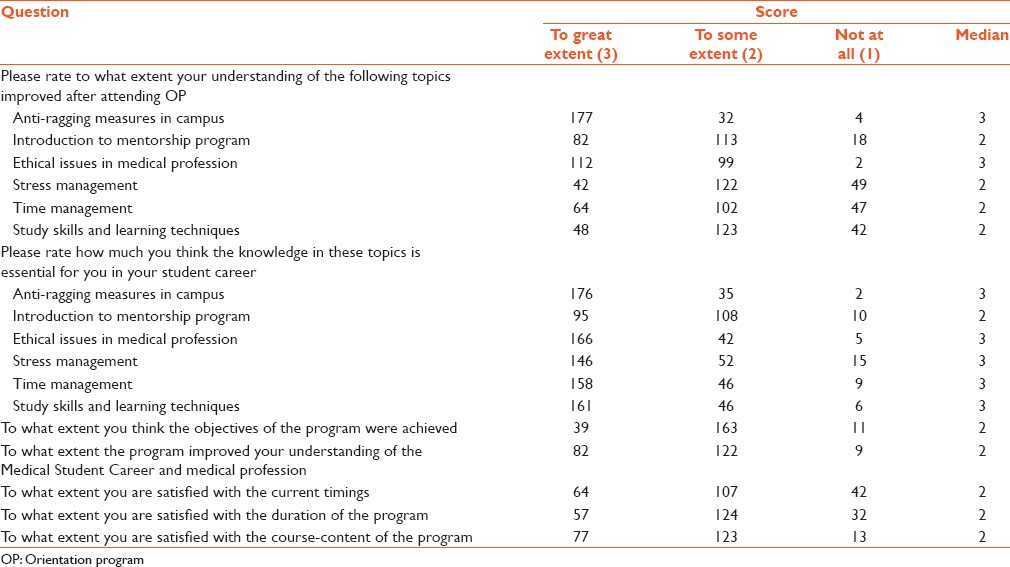
Over-all rating of the program was good (median 3 on a five point Likert scale of excellent = 5, very good = 4, good = 3, satisfactory = 2, poor = 1, can′t say = 0). OP was marked as “very good” and “good” by 35.68% and 37.09% students, respectively.
Only 18.31% stated that the objectives have been achieved to a great extent. A large number reported “no improvement in understanding” on stress management (23%), time management (22.09%) and study skills (19.72%) after program delivery [Figure 1]. 19.72% were “not at all” satisfied with the timings and 15.02% were “not at all” satisfied with the duration of the program [Figure 2].
Figure 1.
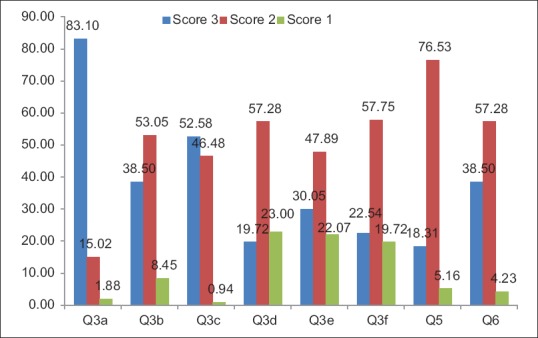
Percentage response of the students to various questions
Figure 2.
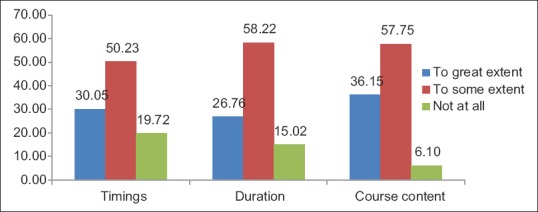
Percentage satisfaction of the students with the timings, duration and course-content of current orientation program
Major factors facilitating learning of the students during OP were – experienced speakers and good topics [Figure 3]; while major factors hindering learning of the students during OP were – only 1-day program and very lengthy sessions [Figure 4].
Figure 3.
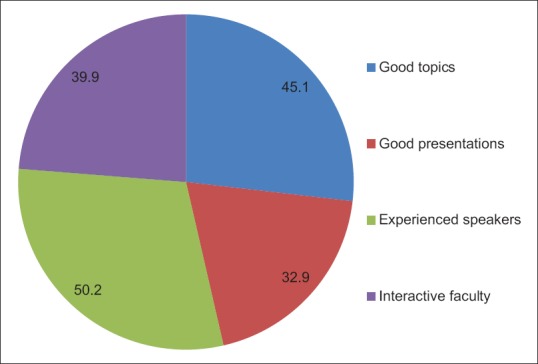
Factors facilitating learning of the students during orientation program
Figure 4.
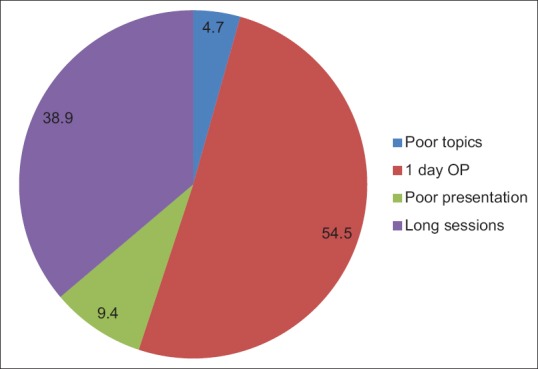
Factors hindering learning of students during orientation program
Of 213 students who have attended OP in the institute and participated in the study, 147 (69.01%) students suggested changes, majority in timings (101 students) and duration (93 students), while changes in the course content were suggested by 62 students only. In total, 37 students asked to conduct more activities during the OP. As students were allowed to give suggestions in more than one field, so the numbers of suggestions (293) are more than the number of students (147) who gave suggestions.
Major student suggestions were: Timings - Conduct it after all have joined, conduct twice a year, conduct after 2–3 months of joining; duration - Should be 2–3 days program, on any day not more than 4 h; course content - Include topics such as communication skills, inter-personal relationship skills, and have more group activities and include other teaching methodologies [Figure 5].
Figure 5.
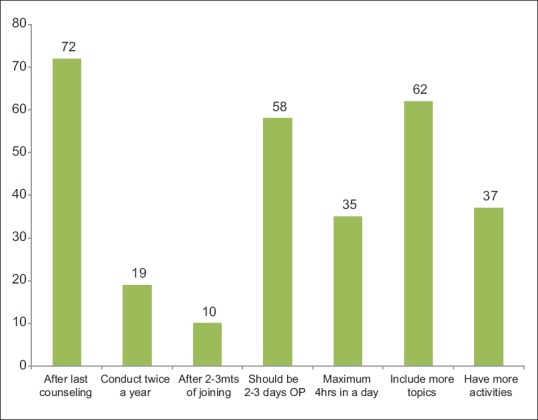
Thematic content analysis of the response of the students regarding suggested changes in the orientation program
Major patterns of FGDs with faculty were: Conduct main program after final counseling, make it a minimum 3 days program, include topics such as social etiquette, interpersonal relationships, communication skills, biomedical waste management, and overview of the whole MBBS curriculum.
DISCUSSION
Program evaluation is defined as the systematic process of collecting, analyzing, and interpreting information that enables judgments to be made about the value of a program and its effectiveness and/or efficiency in achieving a set of outcomes.[5] Program evaluation can help to improve the ongoing program in many ways, like - A program evaluation can find out “what works” and “what does not work”; a program evaluation can showcase the effectiveness of a program to the community and to funders; a program evaluation can improve staff's frontline practice with participants; a program evaluation can increase a program's capacity to conduct a critical self-assessment and plan for the future; and a program evaluation can build knowledge for the out-of-school time field.[6]
The current “OP for fresh MBBS entrants” at our institute is running since 2010. Hence, the need was felt to evaluate the program, keeping in mind students’ and faculty perspective, alike. As the OP is being conducted on the first day of joining after first counseling, the students who got admission at the institute after 2nd or 3rd counseling are not able to attend the OP. Consequently, more than half of the students (51.5% to be precise in this study) never attended institutional OP, thus being at a disadvantage to other students.
Though, overall rating of the OP was good; only 18.31% stated that the objectives of the OP have been achieved to a great extent. A large number reported “no improvement in understanding” on stress management, time management, and study skills after OP. 19.72% were “not at all” satisfied with the timings and 15.02% were “not at all” satisfied with the duration of the program. Many students and faculty members suggested changes in the currently running OP. Based on these suggestions a new OP has been proposed to the authorities, to be implemented from the next academic session [Table 2].
Table 2.
Proposed revised OP for first year MBBS students
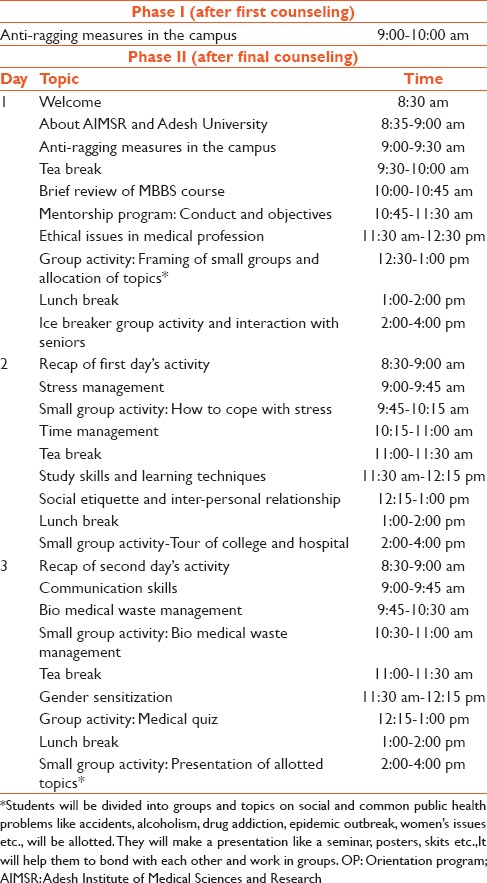
Hopefully, the new program will be able to fulfill the aspirations of the students and the faculty members. We will again review this proposed program (if implemented), after running it for 2–3 years.
Financial support and sponsorship
Nil.
Conflicts of interest
There are no conflicts of interest.
REFERENCES
- 1.True M. 2nd ed. Harrisburg: Technology Council of Central Pennsylvania; 2002. [Last accessed on 2014 Aug 23]. Starting and maintaining a quality internship program; p. 5. Available from: https://www-rohan.sdsu.edu/~gsph/fieldpractice/sites/starting-maintaining-quality-internship-program.pdf . [Google Scholar]
- 2.Rural Medical College, Loni. Orientation Programme for New Entrants. [Last accessed on 2014 Aug 27]. Available from: http://www.pravara.com/pdf/notice2.pdf .
- 3.Mamata Medical College. Medical Education Technology Unit – Orientation Programs Conducted in. 2010. [Last accessed on 2014 Aug 23]. Available from: http://www.mamatamedicalcollege.com/Medical%20Education.html .
- 4.Training Program Evaluation. Evaluation of Training and Learning. [Last accessed on 2014 Sep 06]. Available from: http://www.businessballs.com/trainingevaluationtools.pdf .
- 5.Dolley J. Buckingham, UK: Open University Press; 1994. Planning, monitoring and evaluating learning programmes. [Google Scholar]
- 6.Metz AJ. Why Conduct a Program Evaluation? Five Reasons why Evaluation Can Help an Out-of-school Time Program. [Last accessed on 2015 Mar 21]. Available from: http://www.childtrends.org/wp-content/uploads/2013/04/child_trends-2007_10_01_rb_whyprogeval.pdf .


